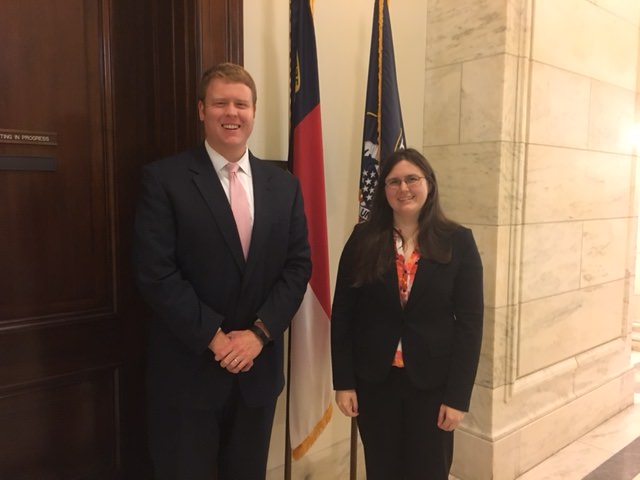
On April 26th, I had the privilege to attend STEM on the Hill Day with BPS. I had attended the March for Science the previous weekend, and I was ready to continue to advocate for science funding by speaking directly to the offices of my representatives. I had concerns about my ability to appeal to some offices, as I had commiserated with others at the march about how some elected officials viewed evidence-based policymaking with skepticism. With this in mind, I tailored my message to the offices I visited.
I went to my first appointment, expecting resistance from the staffer of my senator. I had prepared reasons why basic science funding economically helped my state, as well as a few appeals to national security, but expected to leave the meeting demoralized. I got my first, and largest, surprise of the morning: the staffer agreed with me and promised to commit to funding basic science as part of the upcoming omnibus spending bill. In this age political divisiveness, I had not expected it to be as easy as asking for funding. While we talked about a few of my points, we spent most of our meeting sharing our stories, as the Biophysical Society group spoke more about their individual concerns and how science funding affects us personally.
I assumed this meeting was a fluke, as one data point is not an adequate sample size. However, when I went to the next appointment, I was met with similar enthusiasm and attentiveness. As my sample size grew, I learned that this was the norm rather than the exception. I had few interactions that left me disheartened, as almost everyone I spoke to had broad support for basic science. I think due to the politicization of some aspects of science, we tend to think that all areas will become the same. We believe that denying climate research will automatically lead to slashing the NIH budget. However, I think we can use the broad support of biomedical research to validate other areas of science. Everyone I met believed that cancer, Alzheimer's, and other diseases are worth federal investment. That same belief that people deserve medical care could be used to protect them from Zika virus, pollution, and other climate-change related ailments. What I realized from meeting with the staffers of my congressmen and senators is that our representatives have to do the best they can with the resources they are given. They are constantly bombarded with requests from people with different priorities, and they must choose which ones are funded. It’s easier for elected officials to relate to the patients of cancer and other illnesses, as they have probably encountered similar issues in their own personal life. However, I got the impression that their interactions with scientists are less frequent. To the majority, what we do is an abstract concept, and the best way to advocate for science is to show them how their funding decisions directly affect our careers, and how our research affects others.
I am a young scientist, and my experience with funding only extends to the last decade. However, I remember when sequestration happened, and how it limited my cohort's ability to choose labs when we started graduate school. I remember when budgets were slashed for universities, and my school opted to pass some of the costs to the undergrads because they couldn't absorb all of it by changing the teaching labs. By going to my elected officials, I was able to share these stories and humanize the scientists doing this work. They got to meet someone whose graduate education has been fully funded by the NIH. They got to meet a young scientist that will rely on funding in order to get their next job. Importantly, I didn't go alone, and others in my group could remind them of how mid- and late-career scientists rely on funding as well.
Overall I felt it was a great experience, and I hope to go again. At the very least, it opened up dialogue between my representatives' offices and me, making it much easier for me to send an email in the future. It also allowed me to view my representatives as people, instead of political enemies or allies. When I write in the future, I am going to believe that they want to help me (and their other constituents) and that I need to give them a reason to prioritize my needs over other spending projects. While it’s easy to give in to skepticism and pessimism, I encourage others to communicate with their representatives. It might be easier than you think.
-Christy Gaines
UMBC Graduate Student